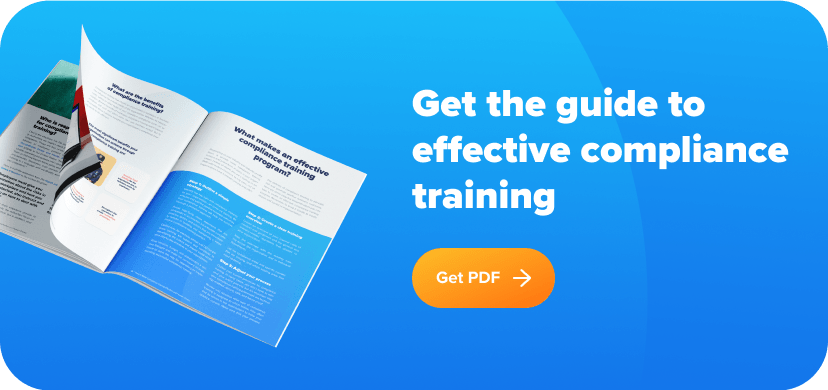Why compliance training is important
Compliance training is important to both companies and employees because it provides the best practice procedures that keep us safe every day. For example, compliance training helps keep customer data secure by training staff in correct data privacy laws and regulations. This is important because it protects customer privacy, helps employees follow best practice and avoid confusion over core responsibilities, and it protects organizations from the legal and reputational risks of non-compliance.
For growing companies, nothing is more important than ensuring compliance with mandatory laws and regulations. But what does compliance mean? Compliance refers to an organization’s adherence to a set of prescribed guidelines or regulations.
This compliance definition isn’t just about adhering to rules. It involves fostering a culture of transparency and accountability within an organization. It signifies a commitment to ethical conduct, diligence, and responsibility. Which is why it’s is a dynamic process that evolves with changes in legislation, industry standards, and societal expectations. That means it isn’t just the responsibility of a single ‘compliance team‘ or a compliance officer; it’s a collective responsibility that extends to all employees.
For some organizations, compliance training is a constant pressure. However, some organizations see wellbeing, and ethics and compliance training, as an opportunity to grow a healthier and more inclusive workplace. Over the past few years, three major shifts have impacted organizations and prompted them to expand their employee compliance training:
- Post-pandemic health – 43% of employees globally (57% in the United States and Canada) are affected by stress according to Gallup. Increasing stress because of uncertainty, changes in their jobs, and remote work post-pandemic calls for organizations to take responsibility and initiatives that support the health and safety of their employees.
- Hybrid and remote training – Many organizations are in a transition to remote and hybrid work. It has become clear with the help of thought leaders like Josh Bersin that organizations need to use their corporate values and culture more actively to keep employees connected with the organization, whilst also battling greater risks when it comes to data privacy and protection.
- Valued diversity and inclusion – The global movement toward improved diversity, equity and inclusion, as well as the increased awareness to fight the climate crisis, have made it essential for businesses to embrace these values. Environmental, social and governance training (ESG) is just one example of rising expectations for compliance training regulations and company commitments to core values.

Examples of employee compliance training
Compliance and training is a big part of any organization’s employee onboarding and annual recurring training. There are several different types of compliance training, depending on the type of business.
For example, financial institutions that have international customers will need to make sure all employees are trained on the Know Your Customer (KYC) regulations.
Likewise, your business may require different forms of compliance training. Here are the most common compliance topics to keep in mind.
Sexual harassment
Sexual harassment training is crucial for maintaining a respectful and safe workplace environment. This training educates employees on recognizing and addressing inappropriate behavior, emphasizing the importance of consent and boundaries.
It aims to prevent unwelcome sexual conduct by fostering awareness and understanding of what constitutes harassment. Additionally, even if this training is not mandatory in your state, it is really important to consider it as it helps to reduce the risk of legal issues and promotes a positive workplace culture. Ensuring all employees are well-informed about these issues helps create a healthier and supportive work environment.
Workplace safety training
Many employers offer compliance training as part of their overall health and safety program. They are designed to help employees learn about their rights and responsibilities in the workplace, as well as the related policies and processes.
Some section topics covered in workplace safety training may include:
- An intro to safety at work including the meaning of occupational health and safety
- How to report hazards at the workplace
- First aid training
- Fire prevention and safety
- Training on emergency procedures
Workplace safety training is often mandated by law. These may be regional, state, or federal laws, or simply the company’s own rules.
Compliance training is also often required for certain types of insurance policies, such as workers’ compensation or business liability coverage. For example, if you’re a business owner and you want to carry insurance, you may be required to provide your employees with compliance training covering topics like sexual harassment and discrimination, because these are two areas where the law is particularly strict about what employers allow in the workplace.
Diversity training
Diversity, equity and inclusion training is a type of compliance training that refers to the education and increased awareness of employees, usually in terms of race, gender, or sexual orientation. This type of training is used to combat discrimination and create an environment where everyone feels comfortable, regardless of any differences they may have.
Furthermore, DEI training helps employees understand why these issues are important and why they need to be part of the business’ overarching mission. Diversity training will not end discrimination overnight, but it will make the workplace a better place for all employees, foster healthier company culture and thus improve productivity and the bottom line too.
Data protection and privacy training
Data protection and privacy training is a vital part of any business’s compliance program. Anyone who works at a company that deals with personal information—whether personally identifiable or protected health information—should receive this training to be able to do their jobs properly and responsibly.
The training must cover what you should do if a breach occurs, as well as the repercussions for violating data protection laws. This can be an important part of managing any business with customer information. If you collect information about your customers, such as credit card numbers or email addresses, you are responsible for keeping it safe from unauthorized access.
While many businesses have their own internal data protection policies, there is legislation in place that dictates how companies should store and handle personal customer information. For example, you cannot use a customer email address to send advertisements without obtaining permission first by disclosing this in your privacy policy (although different countries have different laws on this issue).
In addition to protecting your customers’ data privacy, it is also important to ensure that your own employees are not accidentally revealing sensitive information. You need to train them on what they can say to others about their work, how they should handle customer information when it comes into their possession, and provide training materials on overall cybersecurity practices as well.
A lot of businesses provide data protection training at the start of employment as part of the onboarding process, so that new employees are aware of these issues before they become personally involved with confidential data.
Employee compliance training for human-centric workplaces
According to a McKinsey & Co survey, 36% of employees who have returned to onsite work after the pandemic reported negative mental health effects of onsite work.
Employee compliance training used to play a reactive or defensive role to mitigate risk, but organizations can use it to build inclusive and healthy work environments for people. In the upheaval created by the pandemic, where organizations are reshaping their policies and procedures, this human-centric approach to compliance training puts people first by protecting them and making them feel safe.
You might be wondering whether additional compliance training introduces a financial burden on the organization. Research presented by MIT Sloan Management Review has found that the benefits of training employees and HR about dealing with mental health, and other wellness initiatives outweigh the cost of these initiatives.
While compliance training is an effective way to improve wellbeing and help employees become more productive, it is also an important step in making the business more resilient and avoiding employee misconduct.

Overcoming challenges with eloomi
Recently, our VP of Product Kenneth Granno was interviewed by Cybernews. Sharing insights on some of the ways that compliance, cybersecurity and hybrid work are changing the ways we train. Speaking with Cybernews, Kenneth Granno shared his experience as VP of Product at eloomi to give insights into why companies are turning towards new methods to solve their compliance and cybersecurity training needs. Organizations around the world are looking for solutions to re-engage employees after the pandemic shake-up and to support future growth.
That’s where eloomi comes in. From the managers’ and employers’ points of view, eloomi represents a win-win situation. eloomi digitalizes the training experience, allowing employees to easily access compliance training in a secure, engaging platform, and allowing HR and compliance officers to easily track training outcomes and ensure compliance. On top of that, eloomi aims to simplify processes by providing a platform for effective employee training as a modern tool to improve and learn skills to avoid feeling stuck at work. Here’s how:
- Simplifying employee training
eloomi helps you to manage risk and ensure adherence to rules by making important training automatic via easy-to-manage user enrollment, deadlines, and recurring courses. This feature ensures consistency across your organization, regardless of the team’s size or the complexity of your operations. - Making training interactive
A common challenge when it comes to training is user engagement. If compliance training isn’t engaging enough to get employees involved, you’ll not only be stuck chasing completion deadlines, but also risk a workforce who aren’t retaining the important laws and guidelines that they’ll need to follow. eloomi addresses this concern by providing interactive and engaging training content relevant to various roles encouraging greater participation and involvement. - Access to industry-best training
eloomi also makes it easier to hit goals by offering ready-made industry-best training, curated and updated by trusted providers. This guarantees that you stay up-to-date with changing regulatory environments. You can even create tailored training from scratch for niche but necessary compliance cases. That way you ensure comprehensive coverage of all potential compliance topics. - Tracking and documenting
When it comes to completing annual reports and audits, eloomi simplifies this process by providing real-time reporting. This feature allows businesses to stay updated on their employees’ status continually, identify potential issues, and rectify them promptly. eloomi allows you to generate detailed reports and certificates for annual audits and checks. It is simply a tangible way to measure and document your compliance efforts in a company.
By leveraging eloomi’s powerful management tools, businesses can not only ensure compliance with regulations but also uphold ethical standards, foster trust, and secure their future success. See how you can get started.





